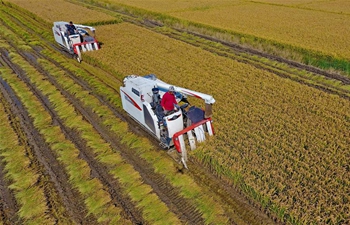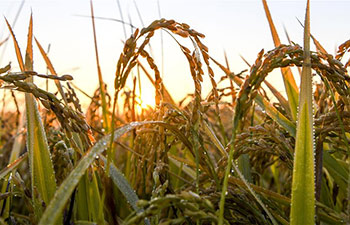JUBA, Sept. 27 (Xinhua) -- South Sudan and the Food and Agriculture Organization of the United Nations (FAO) said Thursday they have developed a long-term plan to fight Fall Armyworm (FAW), an insect that destroys crops.
The UN food agency said the five-year plan for sustainable management and control of Fall Armyworm in South Sudan entails guidance to help the country mobilize resources to significantly reduce yield losses from infestation by the pest.
Pierre Vauthier, FAO Deputy Representative in South Sudan, said the ministry and UN agency have also been able to train trainers at the national, state, county and village levels, as well as training NGOs that work with farmers.
"The highest level of infestation was recorded in the Eastern Equatoria and Central Equatoria regions," Vauthier said in a statement.
Fall Armyworm, which first arrived in Africa in 2016, has quickly spread across the continent, according to FAO. South Sudan reported it first in 2017 and the pest has now spread across the entire country.
Vauthier said the strategic plan provides a chance for effective management and control of Fall Armyworm in order to reduce crop damage and yield loss.
The move comes after the UN food agency on Tuesday introduced a new digital tool to fight the fall armyworm in South Sudan amid massive crop failure caused by the voracious pest.
FAO said that it will be using an early warning mobile application system to enable farmers to document and share information about the location and severity of fall armyworm infestations.
It will distribute electronic tablets to 220 villagers and crop monitoring committees across the east African country to monitor and transmit information about the spread of the fall armyworm.
According to FAO, the pest feeds on more than 80 host plants, but prefers maize or sorghum, the major staple crops in South Sudan.
"Any production loss to this pest is likely to have a significant impact on the already precarious food security situation in the country," the UN agency warned, noting that latest food security situation analysis also shows that around two-thirds of the population are at risk of extreme food insecurity.













